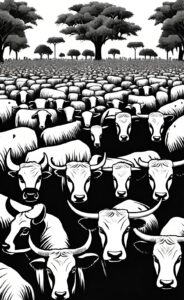The societal pressure to fit in and adhere to mainstream values can feel incredibly overwhelming. This often results in individuals sacrificing their unique identities to blend in with the crowd. However, embracing and expressing your individuality in the face of mainstream conformity is not only liberating but also fundamentally important for personal growth and happiness.
The Impact of Mainstream Media on Individuality
Mainstream media exerts a powerful influence in shaping societal expectations and perceptions of what is normal or desirable. It saturates our daily lives through various channels like TV programs, movies, advertisements, and a steady stream of social media content. This ceaseless barrage of images and messages promotes a certain perception of reality that is often skewed and unrealistic.
When we continuously see these idealized images and lifestyles, we may begin to question our self-worth when we don’t mirror those standards. It creates a paradox where our uniqueness feels like a shortcoming rather than a strength. Consequently, we tend to suppress the very traits and perspectives that make us unique, simply to conform to the mainstream narrative.
This mainstream influence can have a detrimental effect on our self-esteem. It nudges us towards a state of homogeneity, where individuality is traded for fitting in. Unfortunately, this trade-off often leads to the suppression of the rich diversity of thoughts, perspectives, and personal characteristics that contribute to the beauty of human uniqueness. It can stifle creativity, dampen self-expression, and even hamper our emotional and psychological well-being.
Understanding the Difference Between Conformity and Authenticity
To discern the distinction between conformity and authenticity, we must dive into what these terms signify. Conformity refers to the process of tailoring our behaviors, attitudes, and beliefs to align with those that are generally accepted within society. It involves suppressing our individuality and genuineness in order to fit into a pre-established mold or pattern.
Conversely, authenticity is the embodiment of our genuine self, unfiltered by societal expectations. It’s about staying true to our personal values, opinions, and idiosyncrasies, even when they differ from the conventional norms. It is a commitment to honor our individuality and express ourselves honestly and openly, despite external pressures to do otherwise.
An authentic person does not allow societal pressure or mainstream narratives to sway their values or actions. They own their uniqueness and are not afraid to deviate from societal norms if those norms conflict with their personal beliefs or values. This fundamental understanding of the difference between conformity and authenticity lays the groundwork for rejecting mainstream conformity and stepping out as a unique individual.
This distinction is vital in navigating our path towards self-discovery and authenticity. Embracing our authentic selves allows us to break free from the constraints of societal conformity, enabling us to live a life that is truly our own. By distinguishing between these two concepts, we can begin to challenge the societal norms that suppress our individuality and start to embrace and express our unique identities.
The Importance of Being Authentic in a Fake World
In an era where artificiality often takes center stage, embracing authenticity becomes increasingly crucial. Authenticity – being true to ourselves and presenting our genuine selves to the world, is the cornerstone of trust, respect, and impactful relationships. It paves the way for deeper connections, fosters a sense of belonging, and helps build an environment where meaningful interactions thrive. More than that, when we align our actions with our true self, it bolsters our self-esteem and contributes to emotional resilience.
Opting for authenticity over conformity, we not only challenge mainstream narratives but also act as catalysts of change. We give ourselves the permission to be unique, and in doing so, we empower others to shed societal pretenses and embrace their individuality. This ripple effect can disrupt societal norms and push towards a more diverse, accepting world that values individuality over homogeneity.
Being genuine in a world obsessed with perfection and artificial standards of success can be daunting. Yet, it’s worth the effort, for it allows us to live a life that resonates with our values, beliefs, and true self. In essence, our authentic self is our compass, guiding us through life’s complexities and helping us make decisions that align with who we truly are. The world might celebrate the ‘fake,’ but it’s authenticity that brings us closer to our true selves and adds depth to our interactions with others.

> Check Current Book Prices <
Strategies to Maintain Your Uniqueness in a Mainstream Society
Preserving your distinctiveness in a society inclined towards conformity can be a conscious endeavor. One of the key strategies includes mindful consumption of media. This implies critically analyzing and challenging mainstream narratives rather than accepting them unquestioningly. This step helps to counter the influence of media on our perceptions and self-image.
Additionally, allot time for introspection. This will enable you to explore and comprehend your unique traits and values that define your individuality. Understanding your core self is pivotal in maintaining your uniqueness, as it provides a foundation upon which to base your decisions and actions.
Taking actions that align with your beliefs, even if they contradict popular opinion, is another significant strategy. This act of standing by your values can be empowering and instills a sense of authenticity. It enables you to be your true self, even in the face of societal pressures.
Lastly, promoting respect for individuality within your immediate surroundings can create a ripple effect. By appreciating and celebrating the uniqueness of others, you foster an environment that values diversity over conformity. This mutual respect for individuality can help counteract the homogenizing effects of mainstream society and encourage a culture of authenticity and uniqueness.



Nurturing Your Inner Voice: Tips for Staying True to Yourself
Cultivating your inner voice plays a crucial role in preserving your authenticity in a world that often sways towards conformity. Start by attuning to your emotions and gut instincts. These are important indicators of your inner truth, often guiding you towards what genuinely resonates with your core values. Embrace self-care and self-love.
Accept who you are, including your flaws and shortcomings, because they form an integral part of your uniqueness. Build a circle of supportive people who appreciate your individuality and encourage you to express your true self. Emphasize continual learning and personal growth, but always in a manner that aligns with your own terms and pace.
Creating space for these practices in your life can significantly contribute to nurturing your inner voice and thus, help you stay true to yourself amidst societal pressures to conform. Remember, your uniqueness is your strength, and maintaining that authenticity starts with listening and honoring your inner voice.
Embracing Uniqueness is a Journey, Not a Destination
Finding and expressing your unique self is an ongoing process, not a one-time event. It’s a road filled with self-exploration, expression, and, inevitably, challenges. Doubt and uncertainty may creep in, but it’s essential to remember that the goal is authenticity, not blending in with the crowd. As you traverse through a society deeply rooted in mainstream ideals, cherish your individuality.
Always strive to stay authentic, letting your distinctive qualities shine. Your journey might seem solitary at times, but remember, your uniqueness sets you apart, it’s your greatest asset and source of strength. No one else in the world shares your exact combination of traits, beliefs, and experiences, which is indeed your superpower. So, continue to embrace your uniqueness and use it to illuminate your path in the journey of life.





















